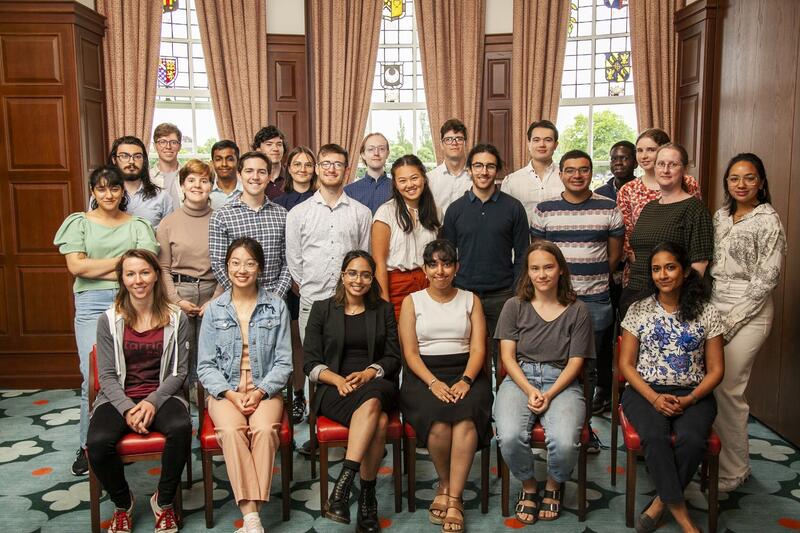CERI Research Symposium Presentations (incl. Youtube links)
Introduction
The Cambridge Existential Risks Initiative (CERI) summer research fellowship (SRF) is a 10-week research training programme for aspiring x-risk researchers held in Cambridge, UK. CERI SRF ’22 concluded with a research symposium on September 5th, and the presentations from that symposium are the subject of this post.[1]
For prospective CERI applicants: CERI SRF ’23 is not yet open to applications; we’re currently evaluating our impact and considering our long term strategy. There will be a Forum post if and when we open our ’23 round. In the meantime, you may be interested in our existential risks introductory course (ERIC), or in EA Cambridge’s seminar programmes in AGI safety and biosecurity.
Presentations
CERI research symposium talks, from both ’22 and ‘21, can be found at the CERI Youtube channel.[2] Below, I break down the ‘22 fellows’ talks by cause area, such that those interested might have a slightly easier time navigating which videos to watch.
AI risk
Technical
Exploring and characterizing surprising generalization behavior in neural networks—Alexander Davies
Mentor: Lauro Langosco
(unavailable) Infrastructure considerations for advanced ML systems—Pranav Gade
Mentor: Jeffrey Ladish
Developing an ‘empathy mechanism’ for AI Agents—Tim Farrelly
Mentors: Ivana Dusparic, Tim Franzmeyer, and Christian Schroeder de Witt
Governance
(unavailable) Article 15 compliance under the EU AI act: How developers and deployers of large foundation models should share regulatory burden—Somsubhro Bagchi
Mentor: Risto Uuk
Understanding applications of artificial intelligence to government surveillance—Catherine Brewer
Mentor: Cecil Abungu
Mentor: Claire Boine
Biorisk
Reimagining epidemic sovereignty: Rethinking global health governance of catastrophic biological risks—Hamza Tariq Chaudhry
Mentor: Catherine Rhodes
Improving DNA synthesis screening to prevent malicious actors from creating dangerous pathogens—Oscar Delaney & Hanna Pálya
Mentors: Becky Mackleprang and Lalitha Sundaram
Identifying technological bottlenecks in bio-surveillance systems—Brianna Gopaul & Ziyue Zeng
Mentor: Akhil Bansal
Avenues for reducing time to detection and alert for infectious disease outbreaks within West African nations—Sam Pritchard
Mentor: Sophie Rose
Nuclear risk
(unavailable) Effects of transformative technologies on nuclear deterrence—Nathan Barnard
Mentor: Matthew Gentzel
Mentor: Rishi Paul
Mentor: Haydn Belfield
Disentanglement and overview of the nuclear risk field—Sarah Weiler
Mentor: Christian Ruhl
Extreme climate change
Investigating the relationship between SRM research and global catastrophic and other related risks—Gideon Futerman
Mentors: Goodwin Gibbins and Jesse Reynolds
(unavailable) Estimating the risks from super pest outbreaks on the global food system—Kirke Joamets
Mentor: anonymous
Miscellaneous and meta x-risk
(unavailable) Cooperation and conflict between AI systems in non-causal contexts—Jim Buhler
Mentors: Caspar Oesterheld, Johannes Treutlein, and a third anonymous mentor
Mentors: Giuliana Rotola and Anders Sandberg
Mentors: Matt Boyd and Andrew Leigh
Acknowledgements
I’m grateful to Nandini Shiralkar for helpful comments on an earlier draft, and to Lin Bowker-Lonnecker, Nandini again, and especially Hannah Erlebach for organising our symposium. Moreover, I’m grateful for all the effort—from the fellows, mentors, and organising team—that went into this summer’s CERI fellowship. It’s a privilege to work with people like you.
CERI SRF ’22 fellows and organisers (and also three of the mentors). Photo by Graham CopeKoga.
Back row, left to right: Nathan Barnard, Tim Farrelly, Pranav Gade, Oscar Delaney, Hanna Palya, Herbie Bradley, Sam Pritchard, Will Aldred, Cecil Abungu, Lin Bowker-Lonnecker
Middle row, left to right: Vara Raturi, Catherine Brewer, Carson Ezell, Gideon Futerman, Yilin Huang, Dewi Erwan, Somsubhro Bagchi, Catherine Rhodes, Hannah Erlebach
Front row, left to right: Sarah Weiler, Ziyue Zeng, Brianna Gopaul, Nandini Shiralkar, Kirke Joamets, Lalitha Sundaram
- ^
Note that CERI’s theory of change is more about upskilling aspiring x-risk researchers (i.e., our fellows), with a view to counterfactually more impactful careers going forward, than it is about the direct impact of fellows’ outputs from the summer.
- ^
Most fellows’ symposium talks can be found on our Youtube channel. Some talks are unavailable on account of infohazards or other reasons.

Hey Will, do you want to put these on EA Radio alongside the Stanford Existential Risk Initiative talks?